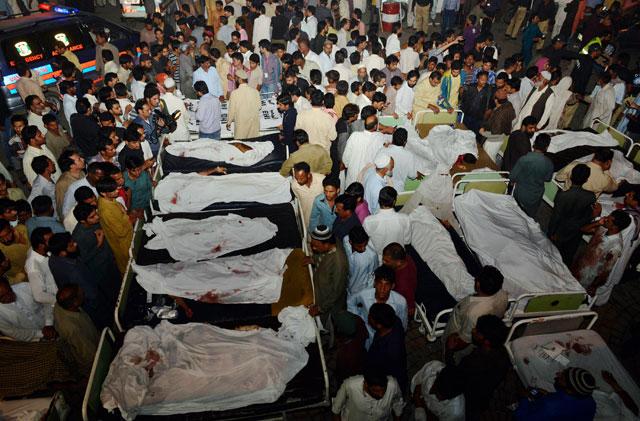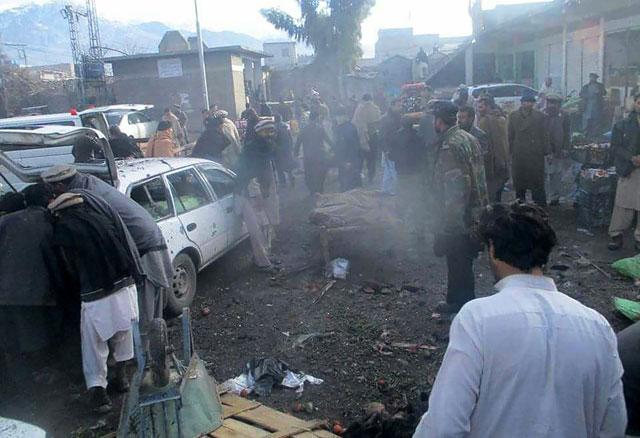You are here
At least 55 killed in suicide blast at Pakistan-India border post — police
By AFP - Nov 02,2014 - Last updated at Nov 02,2014

LAHORE, Pakistan — A suicide bomber killed at least 55 people Sunday at the main Pakistan-India border crossing, the blast tearing through crowds of spectators leaving after the colourful daily ceremony to close the frontier.
The explosion, which wounded more than 120, came at Wagah border gate near the eastern Pakistani city of Lahore after the "flag-lowering" ceremony, a display of military pageantry that attracts thousands of spectators every day and is popular with foreign tourists.
The attack is a rare strike in Punjab, Pakistan's richest and most populous province and powerbase of Prime Minister Nawaz Sharif, which has been spared the worst of the bloody wave of Islamist violence that has assailed the country in recent years.
"It appears to have been a suicide attack. At least 55 people have been killed and more than 120 wounded. Women and children were also killed," Mushtaq Sukhera, the Punjab provincial police chief, told AFP.
It is the deadliest attack to hit Pakistan since a suicide bombing at a church in the northwestern city of Peshawar killed 80 people in September last year.
Sharif expressed "grief and sorrow" over the attack in a statement issued by his office and ordered those responsible to be brought to justice.
His Indian counterpart Narendra Modi condemned the "shocking" and "dastardly" attack. "My condolences to the families of the deceased. Prayers with the injured," he said on his Twitter account.
Huge crowds gather on both sides at Wagah each sunset to see the display of military pageantry that accompanies the formal closing of the border post. It appears the blast took place some distance from the border itself.
Tahir Javed, Punjab provincial commander of the Rangers paramilitary force that guards the frontier, said three of his men had been killed in the blast, which came around 500 metres from the post itself.
There are several security checkpoints on the road leading to the border post, which is equipped with a ceremonial gate and banked seating, and spectators are frisked before entering, though such searches are not always particularly rigorous.
The dead and wounded were taken to Ghurki hospital, where distressed relatives, weeping and hugging each other in grief, searched for their loved ones.
"We were here to watch the parade and the blast took place, the moment we left the venue," Muhammad Imran, aged 12, told AFP as he looked for his three brothers at the hospital.
Conflicting claims
There were several conflicting claims of responsibility for the attack, reflecting the fragmentation the umbrella Tehreek-e-Taliban Pakistan (TTP) movement has undergone in recent weeks.
Abdullah Bahar, a spokesman for a TTP faction loyal to its dead chief Hakimullah Mehsud, said they carried it out to avenge Mehsud's killing in a US drone strike last year.
But the Jamat-ul-Ahrar faction, which broke away from the main TTP leadership in September, rubbished the claim and said they were behind the blast.
Group spokesman Ehsanullah Ehsan said in an e-mail statement the attack was revenge for those killed in the ongoing military operation in North Waziristan tribal area, on the Afghan border. Ehsan said they would soon release video footage of the attack.
TV channels also ran claims from a third militant faction, called Jundullah.
Pakistan has been wracked by a homegrown Taliban insurgency that has killed thousands of people in recent years, but attacks have declined since the army began its offensive in the northwest.
As well as being one of restive Pakistan's few tourist attractions, Wagah is also the main land crossing with India and much of their trade transits through it.
R. P. S. Jaswal, deputy inspector general of India's Border Security Force which guards Wagah, said their side of the border was secure, but security had been stepped up.
"A red alert has been issued keeping in view the blast across the border in... Pakistan," Jaswal told AFP by phone from his base near the city of Amritsar.
The neighbours have had frosty relations since independence from Britain in 1947, fighting three full wars, two over the Himalayan territory of Kashmir.
Related Articles
Pakistan and India went ahead Monday with a colourful military ceremony at a major border post, defying a suicide attack on the event a day earlier that killed 55 people.
LAHORE, Pakistan — Pakistan will launch a paramilitary crackdown on militants in Punjab, the country's richest and most populous province, a
PESHAWAR/DERA ISMAIL KHAN, Pakistan — An explosion in a busy vegetable market killed at least 21 people on Saturday in Pakistan's remote nor


















